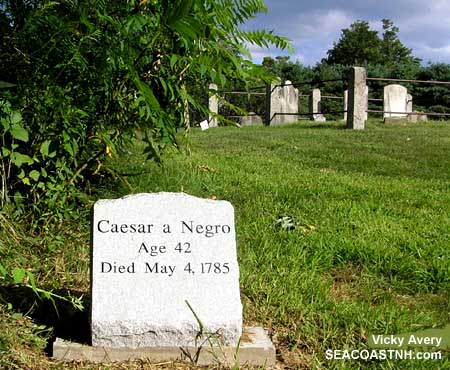|
FRESH STUFF DAILY |
|
|
||
|
|
||
|
|
||
|
SEE ALL SIGNED BOOKS by J. Dennis Robinson click here |
||
Page 1 of 2
His grave was lost to history, until an amateur Seacoast historian tracked the history of one enslaved NH farm worker. Now Caesar Brackett can rest easy. Following is a detailed summary of the historic research and the creation of a new memorial marker in Greenland, NH.
The Caesar Brackett Black History "I can’t walk away from him," Vicky Avery told the local newspaper last year while researchers rolled ground-penetrating radar equipment over the suspected site of an ancient slave burial ground in Greeland, NH. And she didn’t. Today a modern granite marker memorializes the once-forgotten grave. Avery, a member of the local heritage commission, gathered enough scientific information to confirm that the burial site belonged to an enslaved man named Caesar who once worked at the Bracket Farm. Caesar was enslaved to Thomas Brackett who drowned on the Squamscott River in 1785. Caesar died the same year and was buried just outside the white family cemetery, but his grave marker was missing.
A piece of an old tombstone in the collection of the Stratham Historical Society inspired Avery to look for Caesar’s grave. Local historians mistakenly believed that the marker belonged to Caesar Wood, a Stratham slave who served in the Revolutionary War. The marker found its way into the historical society after being sold at an antiques auction, but Avery traced its origin back to the Bracket / Robinson homestead in nearby Avery raised funds to create a new marker for Caesar Brackett and the memorial was dedicated in 2005. A 1966 history of Stratham offers the popular Yankee myth that slavery in New England was somehow less egregious an institution than slavery in the South. Slavery in New Hampshire, the author of the town history suggests "was largely devoid of some of the more obnoxious features that marked the institution elsewhere" and was "materially idyllic" when compared to the South. This popular view -- that there are degrees of human bondage that are more acceptable than others -- is slowly being erased from popular culture. Slavery, as modern historians point out, is slavery. Avery, a "stay-at-home mother of three" worked with local engineers, archeologists and historians to bring the story of Caesar Brackett to light. Each new black history marker, in the tradition of the Portsmouth Black Heritage Trail, helps educates people to the existence of African slavery in this region, a history that dates back to at least 1645. Currently we know nothing about the life of Caesar Brackett. We do not know what he looked like or where he came from or why he died at such a young age. But we now know that he lived and worked in here, and a new marker covers his grave. He is no longer one of the invisible Black residents of New Hampshire. That, at least, is a first step. – JDR CAESAR MEMORIAL continued
Please visit these SeacoastNH.com ad partners.
News about Portsmouth from Fosters.com |
| Thursday, April 18, 2024 |


|
Copyright ® 1996-2020 SeacoastNH.com. All rights reserved. Privacy Statement
Site maintained by ad-cetera graphics

 Stories
Stories




















